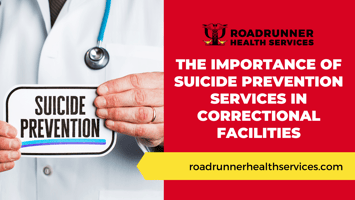Incarcerated individuals face unique challenges, requiring a focus on their well-being. Suicide...
Showing Support in Correctional Facilities: A Comprehensive Guide for Suicide Prevention
This last Suicide Prevention Month, we took the time to look at how advanced correctional healthcare can prioritize the mental well-being in correctional facilities. With the knowledge that suicide rates in correctional facilities are alarmingly higher than in the general population, this guide will look at the factors surrounding suicide risk, as well as prevention measures. Let’s seize this opportunity to make a difference and enhance the lives of those in our care.
Factors Contributing to Suicide in Correctional Facilities
According to the Centers for Disease Control and Prevention (CDC), suicide is the leading cause of death in local facilities and the second leading cause in state prisons; underscoring the need for targeted prevention strategies. Some of the contributing factors are:
- Isolation and Loneliness: The prison population often suffers from profound isolation caused by limited interaction with their family and friends. This overwhelming sense of loneliness not only heightens the risk of depression but also paves the way for dangerous suicidal thoughts.
- Mental Health Disorders: An alarming proportion of the prison population grapples with serious mental health challenges like depression, anxiety, and PTSD, all of which are critical risk factors that can lead to suicide.
- Substance Use Disorders: Substance use disorders is insidious in correctional settings and can exacerbate the effects of mental health disorders, increasing the risk of suicide.
Suicide Prevention Measures in Correctional Facilities
Correctional facilities can put several measures into place to reduce the risk of suicide:
- Comprehensive Suicide Prevention Training: It is imperative that correctional officers, healthcare workers, and all personnel receive ongoing training in suicide prevention so that your team can spot at-risk individuals and know how to respond.
- Screening and Assessment: Routine mental health screenings at both intake and throughout the time in the facility will empower you to accurately evaluate the mental health status of those in your care. This way, those at risk receive the essential support they need, right from the beginning.
- Enhanced Monitoring and Supervision: Those who are at high-risk for suicide should receive enhanced monitoring, which includes regular check-ins..
- Access to Mental Health Services: Ensuring access to mental health professionals, including psychologists and counselors, is absolutely crucial for the well-being of inmates. Therapy sessions and crisis intervention services should not just be available, but integrated into the daily routines of correctional facilities.
- Peer Support Programs: Establishing peer support programs, in which inmates receive training to assist their peers, can significantly cultivate a strong sense of community and effectively diminish feelings of isolation.
The Role of Compassionate Care in Suicide Prevention
According to the National Institute of Mental Health (NIMH), compassionate care is a cornerstone of effective mental health treatment and suicide prevention. When healthcare professionals approach inmates with empathy, they create an atmosphere of trust that encourages individuals to reach out for help. This crucial connection can make all the difference in a vulnerable moment. Here are ways that compassion can affect care:
- Building Trust: Compassionate care builds trust, which is essential for helping those in your care to open up in critical moments.
- Encouraging Help-Seeking Behavior: When those in your care perceive a strong sense of support from healthcare workers, they become more inclined to seek help for their mental health challenges, significantly lowering the risk of suicide.
- Reducing Stigma: Compassionate care is key to breaking down the stigma surrounding mental health issues in correctional facilities. By fostering a supportive environment, we can empower more people to seek out and engage with the vital services they need.
Compassionate Care in Correctional Facilities
We cannot reflect on Suicide Prevention Month without acknowledging the specific hurdles that people encounter within correctional facilities. By investing in suicide prevention training, performing thorough mental health evaluations, and delivering compassionate care, correctional health services can dramatically decrease inmate suicide rates. It is our hope that this proactive stance will not only empower facilities to provide the critical support people require but also create an environment where hope and resilience can still thrive.

%20and%20(MAT)%20Program%20Blog%20Cover%20-Apr-15-2024-09-39-06-3510-AM.png?height=200&name=(SUDs)%20and%20(MAT)%20Program%20Blog%20Cover%20-Apr-15-2024-09-39-06-3510-AM.png)

